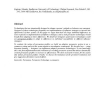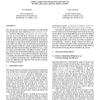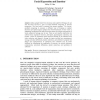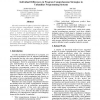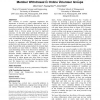115
click to vote
ECIS
2011
14 years 1 months ago
2011
Technologies that are intentionally designed to change a person’s attitude or behaviors are emergent. Designers of these technologies frequently use implementations of influence...
114
click to vote
JCAL
2010
14 years 9 months ago
2010
Abstract The modality learning effect proposes that learning is enhanced when information is presented in both the visual and the auditory domains (e.g. pictures and spoken informa...
106
click to vote
DSS
2002
15 years 1 months ago
2002
Studies of the effect of individual differences on usage of information systems have yielded mixed results. This study examines the effect of individual differences on the perceiv...
105
click to vote
WSC
2004
15 years 3 months ago
2004
The human behavior modeling community has traditionally been divided into those addressing individual behavior models, and those addressing organizational and team models. And yet...
HCI
2007
15 years 3 months ago
2007
The importance of individual characteristics has been emphasized in the human computer interaction and information visualization (IV) literature. However, decision style, which is...
114
click to vote
ERCIMDL
2000
Springer
15 years 5 months ago
2000
Springer
This paper presents a research proposal on user -oriented evaluation method to compar e the usability of Internet search tools. Cognitive style and problem solving style are identi...
141
click to vote
AIHC
2007
Springer
15 years 6 months ago
2007
Springer
Many people believe that emotions and subjective feelings are one and the same and that a goal of human-centered computing is emotion recognition. The first belief is outdated; the...
101
click to vote
ACMICEC
2007
ACM
15 years 6 months ago
2007
ACM
Website success hinges on how credible the consumers consider the information on the website. Unless consumers believe the website's information is credible, they are not lik...
IWPC
2003
IEEE
15 years 7 months ago
2003
IEEE
This study examines the effect of individual differences on the program comprehension strategies of users working with an unfamiliar programming system. Participants of varying pr...
109
click to vote
CHI
2010
ACM
15 years 9 months ago
2010
ACM
The “wisdom of crowds” argument emphasizes the importance of diversity in online collaborations, such as open source projects and Wikipedia. However, decades of research on di...
